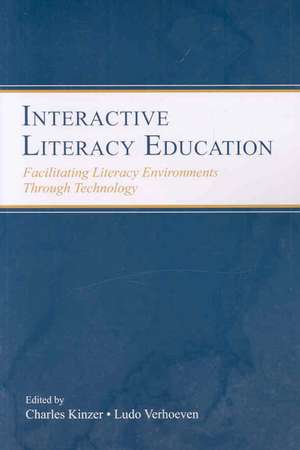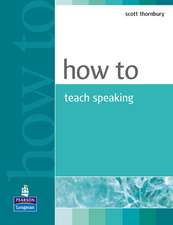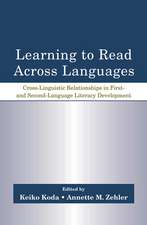Interactive Literacy Education: Facilitating Literacy Environments Through Technology
Editat de Charles K. Kinzer, Ludo Verhoevenen Limba Engleză Paperback – 10 aug 2007
*technology environments and applications that preservice teachers can use with young children;
*detailed information regarding the development and implementation of specific technological programs; and
*various technologies, from interactive reading and spelling programs to speech recognition to multimedia, that teachers can use to enhance their literacy learning environments.
Interactive Literacy Education is intended for graduate courses in methods of literacy instruction; educational technology; curriculum/curriculum design; general preservice education; special education; and applied psychology/cognitive studies. It is also appropriate for use as a supplement in undergraduate courses in methods of literacy instruction and educational technology.
Preț: 383.19 lei
Nou
Puncte Express: 575
Preț estimativ în valută:
73.32€ • 76.75$ • 61.03£
73.32€ • 76.75$ • 61.03£
Carte tipărită la comandă
Livrare economică 31 martie-14 aprilie
Preluare comenzi: 021 569.72.76
Specificații
ISBN-13: 9780805852141
ISBN-10: 080585214X
Pagini: 332
Dimensiuni: 152 x 229 x 17 mm
Greutate: 0.62 kg
Ediția:1
Editura: Taylor & Francis
Colecția Routledge
Locul publicării:Oxford, United Kingdom
ISBN-10: 080585214X
Pagini: 332
Dimensiuni: 152 x 229 x 17 mm
Greutate: 0.62 kg
Ediția:1
Editura: Taylor & Francis
Colecția Routledge
Locul publicării:Oxford, United Kingdom
Public țintă
PostgraduateCuprins
Contents: L. Verhoeven, C.K. Kinzer, Introduction: Facilitating Literacy Environments Through Technology. Part I: Intelligent Tutoring Systems. D. Bouwhuis, A Multi-Agent Perspective on Literacy Learning Environments. B. Wise, R. Cole, S. van Vuuren, S. Schwartz, L. Snyder, N. Ngampatipatpong, J. Tuantranont, B. Pellom, Learning to Read With a Virtual Tutor: Foundations to Literacy. E. Segers, L. Verhoeven, ICT Support in Kindergarten for Children At-Risk. S.M. Williams, P.G. Fairweather, D. Nix, Speech Recognition to Support Early Literacy. J. Mostow, Automated Reading Monitoring: Considering Evaluation Purposes, Excuses, and Methods. R.S. Irausquin, L. Verhoeven, Multi-Agent Based Computer Support for Children With Reading Disabilities. Part II: Interactive Literacy Environments. L.D. Labbo, Designing Kindergarten Classroom Computer Center Literacy Activities: A Theoretical Approach. D. Sharp and the Cognition and Technology Group at Vanderbilt, From Mental Model to Lexicons: The Case of Early Literacy Software. C.K. Kinzer, D.J. Wilber, Computer Support in (Hi)story Construction: Using Technology to Scaffold Student Understanding. N. Mercer, R. Wegerif, L. Dawes, C. Sams, M. Fernandez, How Computers Can Help Children Think Together About Texts. J. Bronkhorst, H. Paus, L. Verhoeven, Examining a National, Online Community in Case-Based Preservice Education. D.J. Wilber, C.K. Kinzer, S. Lohnes, Supporting Preservice Teacher Education Through a Multimedia Case-Based Online Learning Environment.
Notă biografică
Charles K. Kinzer, Ludo Verhoeven
Descriere
Interactive Literacy Education combines the latest research and theory related to technology-based instructional design for children’s literacy development. It shows how technology can be used to build literacy learning environments that are compatible with students’ cognitive and social processes.


